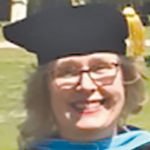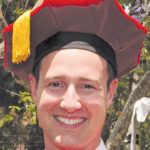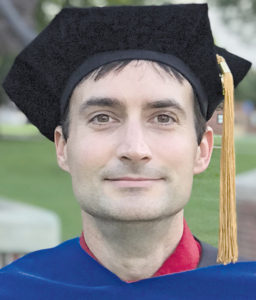‘Education’

Dr. Mariann Braten-Hall is an assistant professor of education at Northwestern and she recently earned her doctoral degree.
Q: Where did you earn your degree?
A: Oral Roberts University in Tulsa.
Q: What was the most challenging part about completing your degree?
A: Balancing all the work that goes on in life, as well as the time, extra writing, and research that goes into a doctorate degree.
Q: How do you feel your degree will impact the way you teach your students?
A: To show my students to work harder with people with diverse backgrounds.
Q: What would you say to students or faculty who are thinking about pursuing doctoral degrees?
A: I encourage them to do so. It takes commitment and hard work. Don’t give up no matter how long it takes.
— Interview by Devyn Lansden, student reporter
‘Choir’

Dr. Karsten Longhurst, director of choral studies and instructor of music, obtained his doctoral degree at the University of Southern California in March 2020.
Q: Where did you earn your doctoral degree, and why did you decide to obtain it there?
A: I earned my degree at Southern California in Los Angeles. I went there because it was an amazing school. It’s an amazing location to study arts. I studied from four different conductors, one primarily, but I had classes from the three others. It also had a three-year doctoral program that enabled me to have a major and two minors, the major being academic emphasis.
In L.A., I got to sing with the Rolling Stones on their 50th tour. We did three shows with them. There were 16 of us singing as backup. So, I loved performing, and I loved to grow as a musician and a teacher too, so, it seemed like a good balance.
Q: What was the most challenging part about completing your degree?
A: Keeping up a balance between my family and a job and just all of my priorities.
Q: How do you feel your degree will impact the way you teach your students?
A: It’s given me a lot of neat experiences. … I feel like, because of the experience that I’ve had, it gives me a lot more to offer than not having any.
So, getting it has helped me in almost every way. I was conducting at the collegiate level while I was there. I was performing, I was performing as a soloist, I was taking classes in theory, in history, in education, and music education.
It’s given me a breadth and a depth, even some discipline, for more information and experiences to share with the students.
Q: What would you say to students and/or faculty who are thinking about pursuing their doctoral degrees?
A: Have a really good reason why you want to do that because many professions don’t require it, and you can still be very successful without an advanced degree. If where you want to be required a doctorate, then that’s when you should be thinking about it.
Otherwise, if you want to be a leader of some type in your field, then a doctorate does help. In order to get a job at a university, you pretty much have to have a doctorate, and that’s what I wanted to do.
— Interview by Laney Cook, student reporter
‘Band’

Dr. Michael Seth Cudd, the director of bands at Northwestern, earned his doctoral degree earlier this year.
Q: Dr. Cudd, where did you earn your doctoral degree, and why did you decide to obtain it there?
A: It was at Rutgers University in New Brunswick, New Jersey. It is a really good school for composition, which was one of the main reasons. Also, me and my wife wanted to live close to New York City.
Q: What was the most challenging part about completing your degree?
A: I would say working full time while trying to finish it that was the hardest thing.
Q: How do you feel your degree will impact the way you teach your students?
A: That’s a hard one. I think I always try to teach students with the idea that they might go to grad school … so I always try to prepare them for grad school. So, in a way, I would say that it impacted the way I teach those students in the way I prepare them.
Q: What would you say to students or faculty who are thinking about pursuing doctoral degrees?
A: Try not to work full time and go to school is what I would say.
— Interview by Connor Gray, student reporter
